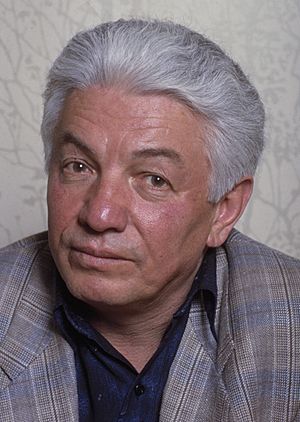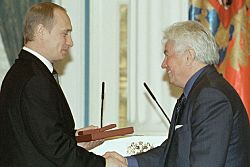Vladimir Voinovich facts for kids
Quick facts for kids
Vladimir Voinovich
|
|
|---|---|

Voinovich in 1986
|
|
| Born | 26 September 1932 |
| Died | 27 July 2018 (aged 85) Moscow, Russia
|
| Resting place | Troyekurovskoye Cemetery |
| Occupation | Writer |
| Years active | 1960–2018 |
|
Notable work
|
The Life and Extraordinary Adventures of Private Ivan Chonkin (1969–2007) Moscow 2042 (1986) Monumental Propaganda (2000) |
| Awards | Andrei Sakharov Prize For Writer's Civic Courage, State Prize of the Russian Federation |
Vladimir Nikolayevich Voinovich (Russian: Влади́мир Никола́евич Войно́вич) was a famous Russian writer. He was born on September 26, 1932, and passed away on July 27, 2018. He was also known as a dissident, which means he spoke out against the government of the Soviet Union.
Many people consider him the first truly funny writer to come from the Soviet system. His most famous books include The Life and Extraordinary Adventures of Private Ivan Chonkin, which is a funny story, and Moscow 2042, which describes a future that is not very good. The Soviet authorities forced him to leave the country and took away his citizenship in 1980. However, he was later allowed to return to Russia in 1990. Even after the Soviet Union ended, he continued to speak out against Russian politics.
Contents
About Vladimir Voinovich's Life
Early Years and Family Background
Vladimir Voinovich was born in a city called Stalinabad, which is now Dushanbe, in the Soviet Union. He said his father was from Serbia and translated Serbian books. His mother was Jewish. Voinovich believed his father's family was part of a noble Serbian family.
In 1936, when Vladimir was young, his father was arrested. He was accused of speaking against the Soviet government. His father spent five years in labor camps, which were like prisons where people were forced to work.
Voinovich started his studies in Moscow. He tried to get into a special writing school but didn't succeed. Instead, he went to a teaching institute to study history. He later said he spent some time in Kazakhstan to find ideas for his writing. When he came back to Moscow, he started working on his first novel.
Becoming a Writer and Speaking Out
Voinovich's first books were We Live Here and I Want To Be Honest. In 1969, he published the first part of his funny novel, The Life and Extraordinary Adventures of Private Ivan Chonkin. This book was about a Russian soldier during World War II. The second part of the book came out in 1971.
Around this time, the Soviet government started to control what was published more strictly. Voinovich's books stopped being published in the Soviet Union. But people still read his work through samizdat, which were handwritten or typed copies passed around secretly. His books were also published in Western countries.
In 1974, the authorities began to bother Voinovich because of his writing and his political views. He was removed from the Soviet Writers' Union that same year. His phone line was cut off in 1976.
In 1980, he and his family were forced to leave the country. The government took away his citizenship. He moved to Munich, in West Germany, after being invited by an art academy. For a while, he worked for a radio station called Radio Liberty. Voinovich also helped publish a famous novel called Life and Fate by secretly getting photo films of the book out of the country.
In 1987, he published another one of his most famous books, Moscow 2042. In 1990, the Soviet leader, Mikhail Gorbachev, gave Voinovich his citizenship back. After that, Voinovich moved back to Russia.
Speaking Out in Russia
Even after the Soviet Union ended, Voinovich continued to share his political opinions. In 2001, he signed a public letter to support a TV channel. In 2003, he signed a letter against a war in Chechnya.
In 2015, he wrote an open letter to the President of Russia, Vladimir Putin. In this letter, he asked Putin to release a Ukrainian pilot who was on a hunger strike. He warned that her death could have a very bad effect on how the world viewed Russia. In an interview that same year, Voinovich said that things were "worse today" in some ways than during the Soviet era. He felt that the freedoms people had were "just leftovers."
In 2017, he also criticized President Putin in an interview. He said that Putin had made the country more traditional and less focused on the future. He felt that the political situation in Russia was similar to the 1970s in the Soviet Union. He noted that demonstrations were being broken up and people were being put in prison.
Family Life
Voinovich was married three times. He had two children, Marina and Pavel, with his first wife, Valentina. His son Pavel also became a writer. With his second wife, Irina, he had a daughter named Olga, who is a German writer. After Irina passed away, Voinovich married Svetlana. They lived in Moscow.
Vladimir Voinovich died on July 27, 2018, from a heart attack.
Vladimir Voinovich's Books
The first two parts of his most important work, The Life and Extraordinary Adventures of Private Ivan Chonkin, are set during World War II. They humorously show the silly things that happened every day under the totalitarian government. The character "Chonkin" is now very well-known in Russian culture. A Czech director even made a movie based on the book. Many people have noticed that the story of Chonkin is similar to another famous book, The Good Soldier Švejk.
The third part of the Chonkin novel was published in 2007. It tells about the characters' lives after the war, including Chonkin moving to the USA. The author said it took him almost fifty years to write the whole novel. Some people have called it the Soviet version of Catch-22.
In 1986, he wrote a dystopian novel called Moscow 2042. A dystopian novel describes a future society that is very bad or frightening. In this book, Voinovich imagined a Russia ruled by a group that combined the secret police, the church, and the Communist Party. The book even predicted some things that later happened in Russia after the Soviet Union fell.
Voinovich's other books have also been praised. The Fur Hat is a funny story that reminds people of another famous Russian book, The Overcoat. His book Monumental Propaganda criticizes Russia after communism. It shows that the author believed Russians hadn't changed much since the time of Joseph Stalin. This book has been described as showing "the way false idols and wrong historical ideas continue to exist."
His funny memoir The Ivankiad tells a true story. It's about his efforts to get a better apartment in the very slow and complicated Soviet system.
In 2002, he published a book of memoirs called A Portrait Against the Background of a Myth. In this book, he strongly criticized another famous writer, Aleksandr Solzhenitsyn. Voinovich said Solzhenitsyn created too much attention around himself and didn't write very well. The book received different reactions from people.
He also published his own memoirs in 2010.
Awards and Honors

Voinovich received the State Prize of the Russian Federation in 2000. He won it for his book Monumental Propaganda. This book was about the ideas of Stalin that still existed in the minds of many Russian citizens. He also received the Andrei Sakharov Prize for Writer's Civic Courage in 2002.
See also
 In Spanish: Vladímir Voinóvich para niños
In Spanish: Vladímir Voinóvich para niños
 | Jessica Watkins |
 | Robert Henry Lawrence Jr. |
 | Mae Jemison |
 | Sian Proctor |
 | Guion Bluford |

